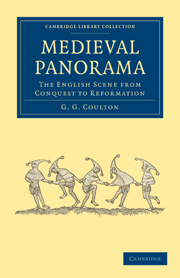Book contents
- Frontmatter
- Contents
- Illustrations
- Preface
- Introduction
- Chapter 1 The Cauldron of God's Wrath
- Chapter 2 Bishops of Rome
- Chapter 3 Conversion of the Wild Men
- Chapter 4 Feudalism emerges
- Chapter 5 Land and Folk
- Chapter 6 The Village (1)
- Chapter 7 The Village (2)
- Chapter 8 Village Dance and Song
- Chapter 9 Nature and Superstition
- Chapter 10 Popes and Prelates
- Chapter 11 Rector and Vicar
- Chapter 12 The Making of a Priest
- Chapter 13 Church statistics
- Chapter 14 The Shepherd
- Chapter 15 The Flock (1)
- Chapter 16 The Flock (2)
- Chapter 17 The Silver Lining
- Chapter 18 Dante's Commedia
- Chapter 19 The Royal Court
- Chapter 20 Chivalry
- Chapter 21 Chaucer and Malory
- Chapter 22 The Monastery
- Chapter 23 Cloister Life
- Chapter 24 The Town
- Chapter 25 Home Life
- Chapter 26 Trade and Travel
- Chapter 27 Just Price and Usury
- Chapter 28 The Ghetto (1)
- Chapter 29 The Ghetto (2)
- Chapter 30 Justice and Police
- Chapter 31 From School to University
- Chapter 32 Scholastics and Bible
- Chapter 33 Science
- Chapter 34 Medicine
- Chapter 35 Freethought and Inquisition
- Chapter 36 The Papal Schism
- Chapter 37 The Lollards
- Chapter 38 The Black Death
- Chapter 39 The Hundred Years' War
- Chapter 40 The Mystics
- Chapter 41 The Peasant Saint
- Chapter 42 Artist Life
- Chapter 43 Literary Life
- Chapter 44 Sports and Theatre
- Chapter 45 Women's Life
- Chapter 46 Marriage and Divorce
- Chapter 47 The Old and the New
- Chapter 48 More and Utopia
- Chapter 49 The Fight for the Bible
- Chapter 50 The Open Bible
- Chapter 51 Peasant and Highbrow
- Chapter 52 The Bursting of the Dykes
- Notes
- Index
- Plate section
Chapter 13 - Church statistics
Published online by Cambridge University Press: 05 July 2011
- Frontmatter
- Contents
- Illustrations
- Preface
- Introduction
- Chapter 1 The Cauldron of God's Wrath
- Chapter 2 Bishops of Rome
- Chapter 3 Conversion of the Wild Men
- Chapter 4 Feudalism emerges
- Chapter 5 Land and Folk
- Chapter 6 The Village (1)
- Chapter 7 The Village (2)
- Chapter 8 Village Dance and Song
- Chapter 9 Nature and Superstition
- Chapter 10 Popes and Prelates
- Chapter 11 Rector and Vicar
- Chapter 12 The Making of a Priest
- Chapter 13 Church statistics
- Chapter 14 The Shepherd
- Chapter 15 The Flock (1)
- Chapter 16 The Flock (2)
- Chapter 17 The Silver Lining
- Chapter 18 Dante's Commedia
- Chapter 19 The Royal Court
- Chapter 20 Chivalry
- Chapter 21 Chaucer and Malory
- Chapter 22 The Monastery
- Chapter 23 Cloister Life
- Chapter 24 The Town
- Chapter 25 Home Life
- Chapter 26 Trade and Travel
- Chapter 27 Just Price and Usury
- Chapter 28 The Ghetto (1)
- Chapter 29 The Ghetto (2)
- Chapter 30 Justice and Police
- Chapter 31 From School to University
- Chapter 32 Scholastics and Bible
- Chapter 33 Science
- Chapter 34 Medicine
- Chapter 35 Freethought and Inquisition
- Chapter 36 The Papal Schism
- Chapter 37 The Lollards
- Chapter 38 The Black Death
- Chapter 39 The Hundred Years' War
- Chapter 40 The Mystics
- Chapter 41 The Peasant Saint
- Chapter 42 Artist Life
- Chapter 43 Literary Life
- Chapter 44 Sports and Theatre
- Chapter 45 Women's Life
- Chapter 46 Marriage and Divorce
- Chapter 47 The Old and the New
- Chapter 48 More and Utopia
- Chapter 49 The Fight for the Bible
- Chapter 50 The Open Bible
- Chapter 51 Peasant and Highbrow
- Chapter 52 The Bursting of the Dykes
- Notes
- Index
- Plate section
Summary
This chapter deals with a number of subjects important for the comprehension of English social life. Amid this multiplicity, logical sequence seems preferable to chronological. Sufficient dates are given to guide the reader, who can thus judge roughly for himself how far conditions improved or deteriorated during our period. He will probably conclude that time wrought here its usual effects. Men were struggling onwards to something better, but fitfully and sometimes blindly, as in other ages before or since. Wherever the betterment was only piecemeal or superficial, the old abuses went on wearing deeper and deeper ruts; so that Hildebrand's reforming efforts cannot be fully understood without reference to the state of things in More's age; nor is More's age fully comprehensible except in the light of Hildebrand's struggles.
We have seen how often the better livings either went to influential young men or were absorbed by monasteries and cathedrals who put in vicars, generally at starveling wages. But an even greater abuse was that of pluralism, with its natural consequence of non-residence. It was not only that the fattest benefices were often distributed for unspiritual reasons; this has been the case to some extent in all ages, although the last two or three generations of our own time have made an enormous difference, and the Anglican Church has at last the theory, and to some real extent the practice, that a curate, by efficient work and steady merit, shall within a reasonable time find his way into a benefice.
- Type
- Chapter
- Information
- Medieval PanoramaThe English Scene from Conquest to Reformation, pp. 154 - 170Publisher: Cambridge University PressPrint publication year: 2010First published in: 1938



